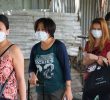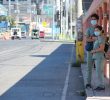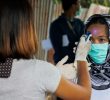DAVAO CITY, Philippines – Scientists from the University of the Philippines raised concerns on the continuing errors and delays in the Department on Health statistics on the coronavirus diseases (COVID-19) cases in the Philippines.
The group Advocates of Science and Technology for the People (Agham) posted on their Facebook page pointing out the 14,000 cases tabulated by DOH last week did not show an accurate picture of the spread of the disease because of the delay release of validated test results.
Another UP research report pointed out the discrepancy between their report from the DOH. Agham said their reports estimate 21,000 cases have been tabulated as of May 26, a discrepancy of 7,000.
“Due to backlogs in case verification and confirmation – which now stands at nearly 7,000 positive tests – the reported daily count of total and new cases are not in real-time, and reflect data from weeks ago,” Agham said.
The Department of Health has been working with ThinkWell, an international health systems development group in tabulating the cases. Last May 18, DOH and ThinkWell explained the backlog is a result of various factors.
ThinkWell’s Senior Policy Advisor Dr. Maria Eufemia Yap explained that the reporting schedule or the cut-off time, along laboratory personnel overwhelmed by the surge of tests, have affected the timely release of test results.
She said that test results are normally transmitted at the time the machine has not yet finished processing all samples.
“In the absence of an automatic extractor, extraction is done by the laboratory personnel. This requires a certain degree of familiarity without which the process might take time to finish,” Yap said.
DOH assured that the issues raised with regards to the data comprise only a nominal percentage of the whole data set and does not affect the overall interpretation and decision making.
They also said the sudden increase in reported COVID-19 cases due to the aggressive validation using the COVIDKAYA information system, a digital surveillance information system developed with the World Health Organization Country Office that automates several data collection processes to minimize encoding errors.
But Agham criticized the DOH and its private data handler for downplaying that these discrepancies only comprise 1% of all data.
“It will be a costly mistake to continue to use inaccurate, delayed, inconsistent data as the basis for decisions on managing the pandemic. Any action based on this data may lead to grave repercussions to public health,” they reiterated.
Agham urged DOH to enhance their data gathering and make timely release of reports to determine the forecast and analysis of policy makers and scientists.
“Our ability to use data to make decisions will be hampered if the DOH does not improve data access and quality,” the report said.
UP Fellows and associates of OCTA Research Prof. Guido David, Ranjit Singh Rye and Ma. Patricia Agbulos also recommended the Philippine National Volunteer Agency to mobilize volunteers in the verification work provided with personal protective equipment and support. (davaotoday.com)










